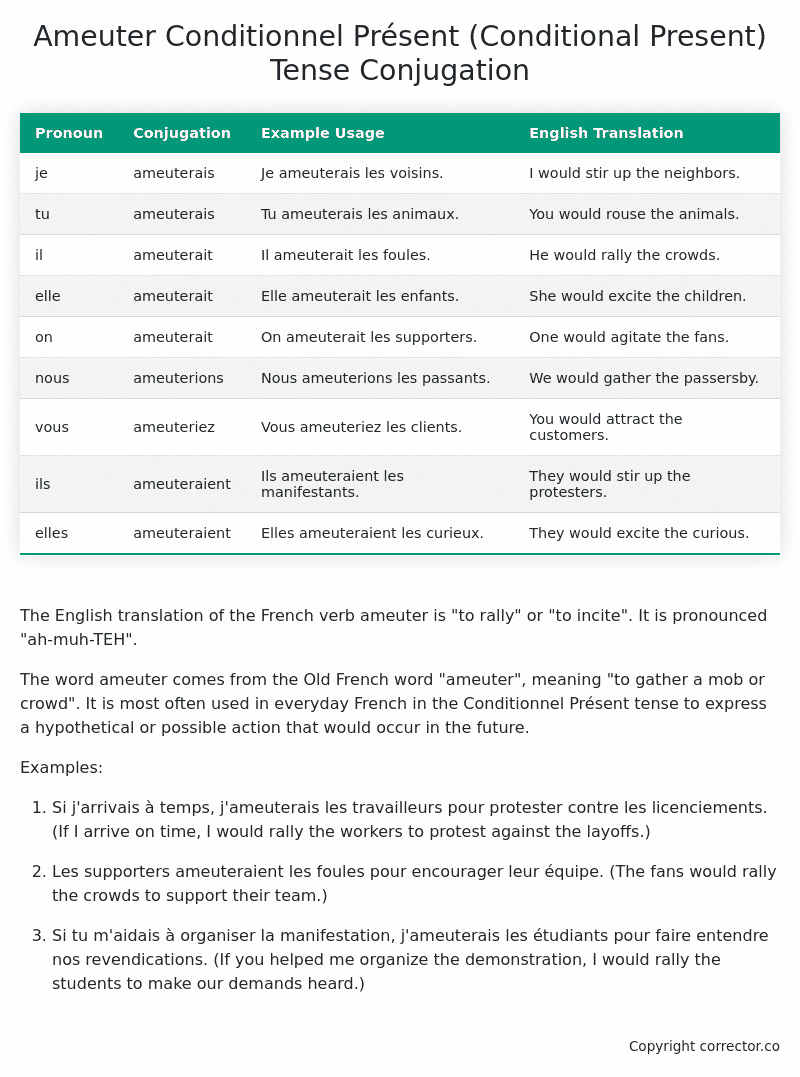Conditionnel Présent (Conditional Present) Tense Conjugation of the French Verb ameuter
Introduction to the verb ameuter
The English translation of the French verb ameuter is “to rally” or “to incite”. It is pronounced “ah-muh-TEH”.
The word ameuter comes from the Old French word “ameuter”, meaning “to gather a mob or crowd”. It is most often used in everyday French in the Conditionnel Présent tense to express a hypothetical or possible action that would occur in the future.
Examples:
-
Si j’arrivais à temps, j’ameuterais les travailleurs pour protester contre les licenciements.
(If I arrive on time, I would rally the workers to protest against the layoffs.) -
Les supporters ameuteraient les foules pour encourager leur équipe.
(The fans would rally the crowds to support their team.) -
Si tu m’aidais à organiser la manifestation, j’ameuterais les étudiants pour faire entendre nos revendications.
(If you helped me organize the demonstration, I would rally the students to make our demands heard.)
Table of the Conditionnel Présent (Conditional Present) Tense Conjugation of ameuter
| Pronoun | Conjugation | Example Usage | English Translation |
|---|---|---|---|
| je | ameuterais | Je ameuterais les voisins. | I would stir up the neighbors. |
| tu | ameuterais | Tu ameuterais les animaux. | You would rouse the animals. |
| il | ameuterait | Il ameuterait les foules. | He would rally the crowds. |
| elle | ameuterait | Elle ameuterait les enfants. | She would excite the children. |
| on | ameuterait | On ameuterait les supporters. | One would agitate the fans. |
| nous | ameuterions | Nous ameuterions les passants. | We would gather the passersby. |
| vous | ameuteriez | Vous ameuteriez les clients. | You would attract the customers. |
| ils | ameuteraient | Ils ameuteraient les manifestants. | They would stir up the protesters. |
| elles | ameuteraient | Elles ameuteraient les curieux. | They would excite the curious. |
Other Conjugations for Ameuter.
Le Present (Present Tense) Conjugation of the French Verb ameuter
Imparfait (Imperfect) Tense Conjugation of the French Verb ameuter
Passé Simple (Simple Past) Tense Conjugation of the French Verb ameuter
Passé Composé (Present Perfect) Tense Conjugation of the French Verb ameuter
Futur Simple (Simple Future) Tense Conjugation of the French Verb ameuter
Futur Proche (Near Future) Tense Conjugation of the French Verb ameuter
Plus-que-parfait (Pluperfect) Tense Conjugation of the French Verb ameuter
Passé Antérieur (Past Anterior) Tense Conjugation of the French Verb ameuter
Futur Antérieur (Future Anterior) Tense Conjugation of the French Verb ameuter
Subjonctif Présent (Subjunctive Present) Tense Conjugation of the French Verb ameuter
Subjonctif Passé (Subjunctive Past) Tense Conjugation of the French Verb ameuter
Subjonctif Imparfait (Subjunctive Imperfect) Tense Conjugation of the French Verb ameuter
Subjonctif Plus-que-parfait (Subjunctive Pluperfect) Tense Conjugation of the French Verb ameuter
Conditionnel Présent (Conditional Present) Tense Conjugation of the French Verb ameuter (this article)
Conditionnel Passé (Conditional Past) Tense Conjugation of the French Verb ameuter
L’impératif Présent (Imperative Present) Tense Conjugation of the French Verb ameuter
L’infinitif Présent (Infinitive Present) Tense Conjugation of the French Verb ameuter
Struggling with French verbs or the language in general? Why not use our free French Grammar Checker – no registration required!
Get a FREE Download Study Sheet of this Conjugation 🔥
Simply right click the image below, click “save image” and get your free reference for the ameuter Conditionnel Présent tense conjugation!

Ameuter – About the French Conditionnel Présent (Conditional Present) Tense
Formation
Common Everyday Usage Patterns
Expressing Polite Requests
Expressing Hypothetical Situations
Expressing Doubt or Uncertainty
Interactions with Other Tenses
Present Tense
Past Tense
Future Tense
Conditional Perfect
Summary
Want More?
I hope you enjoyed this article on the verb ameuter. Still in a learning mood? Check out another TOTALLY random French verb conjugation!


